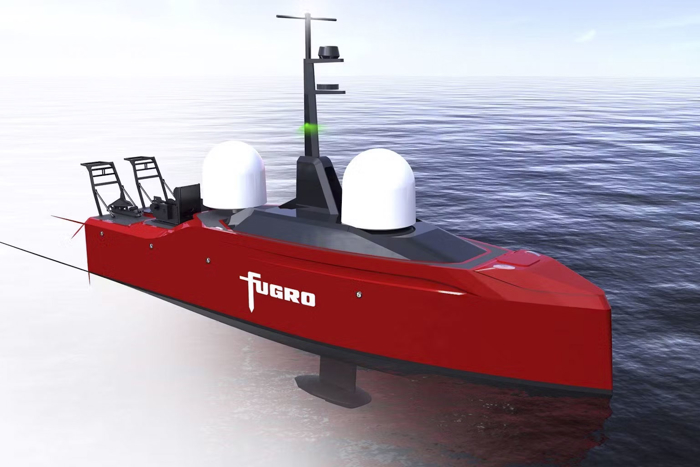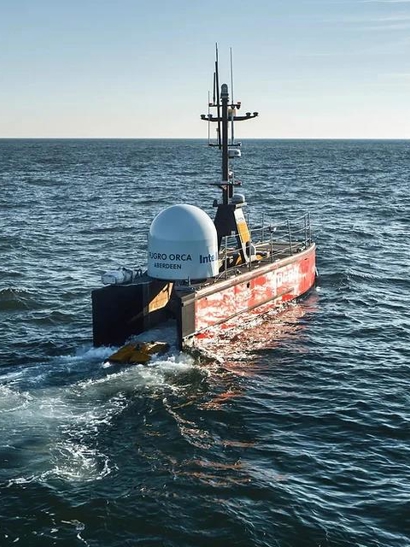Back in 2017, LR issued the first goal-based code for Unmanned Marine Systems (UMS) with the expectation that the new technology would enter into widespread use through multiple sectors of the maritime industry.
Seven years later and LR has granted eight vessels with UMS certification, primarily in the naval sector. There is, however, a growing appetite for the commercial take up of UMS technology as the industry rapidly adopts autonomous and remote operated vessels.
Laying the foundations with Fugro and SEA-KIT
Among LR's significant projects is its collaboration with Fugro, a leading geo-data specialist which acquired hi-tech uncrewed surface vessel designer and builder SEA-KIT in 2023. From humble beginnings in 2020, the company moved on from ad hoc projects to a more structured approach as regulatory bodies started recognising the importance of uncrewed systems.
“Previously our work with Fugro was primarily specialised and one-off projects, then regulation became a priority for flag states and our relationship (with Fugro) helped us to shape a standardised process that we use to this day,” Matthew Palmer, LR's Global Naval Business Lead tells Horizons.
Palmer recalls the initial scepticism about the feasibility of certifying an entire fleet, but LR has successfully certified five vessels, with a new larger vessel undergoing a technology qualification workshop at Fugro’s headquarters. The project for the direct drive vessel ‘Prism’ exemplifies the streamlined processes and trust that Fugro has placed in LR, he says, allowing for smooth and efficient certification without an extensive case-by-case process.

Breaking new ground: Workboat Code 3
Another noteworthy prospect for LR is the potential to be the first to certify an uncrewed system under the Maritime Coastguard Agency ‘s (MCA) Workboat Code 3.
Applicable to vessels under 24m in length that do not fall under the load line convention, the workboat code 3 (WBC3) is seen as a global standard, especially for small vessels flagged in a country without their own applicable equivalent. The biggest driver between WBC3, and its previous edition WBC2, is the addition of novel technologies through annexes for alternative fuels, Palmer explains.
With only eight conventional boats certified under the code, LR is poised to lead the way with Fugro’s largest UMS vessel in the near future. The project will not only represent a milestone for LR, but also sets a precedent for future uncrewed systems, aligning with both Workboat Code 3 and UMS standards.
LR’s projects are not limited to small-scale vessels. The Fugro Prism, at 15m, is the largest project that Fugro has undertaken. There is also a collaboration with a South American partner for a 24-metre vessel that will represent the first fully classed uncrewed system. “Such projects exemplify the growing trend of larger and more sophisticated uncrewed vessels,” says Palmer, “pushing the boundaries of what is possible in maritime technology.”
The evolving landscape of uncrewed maritime systems is blurring the lines between traditional classed vessels and new technologies. Palmer notes that many uncrewed vessels are now approaching the standards of class vessels, necessitating a flexible and goal-based approach. This adaptability ensures that the certification process is not overly burdensome, making it more attractive to operators of smaller vessels.
It’s no longer just one or two vessel projects. We are now looking at UMS certification of entire fleets, and working out how to provide our UMS services efficiently and on a wider scale.
Overcoming challenges and looking ahead
Through its work in pioneering certifications and new regulations to exploring alternative fuels and larger uncrewed vessels, LR is setting new standards and driving the industry towards a more sustainable and innovative future.
As Palmer puts it, LR’s “secret sauce” lies in a flexible, technology-agnostic approach and an ability to adapt and lead in this rapidly evolving field, where the landscape on UMS certification is constantly shifting.









